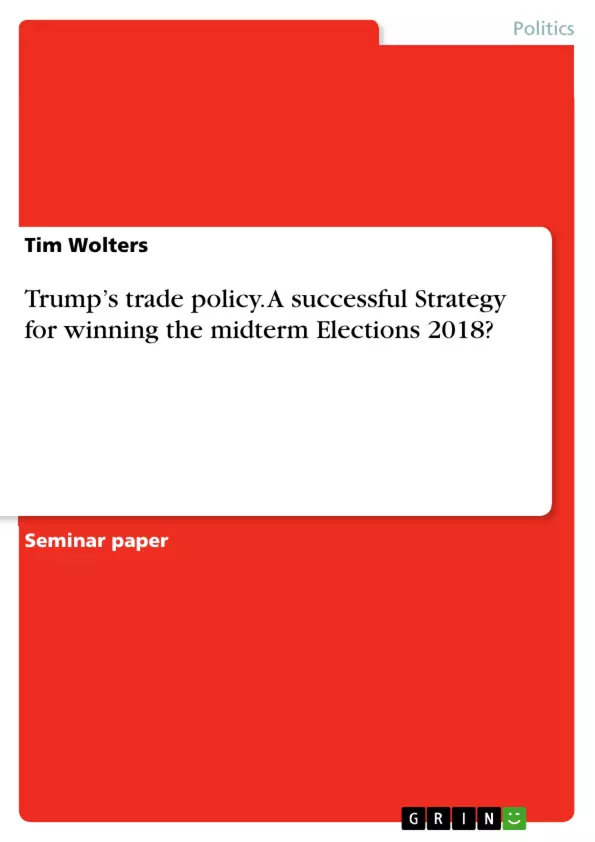The case study wants to use the political-strategic approach to populism to explain the phenomena of Trump’s trade policy and the outcome of populists and therefore republican vote share to understand the impact on the 2018 mid-term election results for the republican party. With the focus on the 2018 mid-term elections, is it essential to limit the time span for this case study from Trump’s inauguration until the mid-term election 2018.
Followed by this introduction is the chapter about the theoretical theory for this final paper, the political-strategic approach to populism by Kurt Weyland, followed by the empirical chapter about Trump’s trade policy until the mid-term elections 2018 and the impact on populists and therefore republican vote share, followed by the impact on the republican election results in the mid-term elections 2018. The last chapter presents the research results and a conclusion and implications for further research. Therefore, it is necessary to lay out the theoretical foundation of this paper, the political-strategic approach to populism in the next chapter as a starting point for this research to determine if Trump’s trade policy was successful.
Inhaltsverzeichnis (Table of Contents)
- Trump's trade policy: A successful strategy for winning the midterm elections 2018?
- Donald Trump's brake with Americas foreign policy traditions
- Theoretical overview
- The Political-Strategic Approach to Populism
- Defining populist voters
- Trump's trade policy: A successful strategy for winning the midterm elections 2018?
- Impact on populist voting behavior in the 2018 midterm elections
- Impact on republican election results in the 2018 midterm elections
- Research results and conclusion
Zielsetzung und Themenschwerpunkte (Objectives and Key Themes)
This paper examines the impact of Donald Trump's trade policy on populist voters in the 2018 midterm elections. Specifically, it aims to determine whether Trump's trade policies resonated positively with populist voters and contributed to the Republican Party's performance in the elections. The research is guided by the political-strategic approach to populism, which views populism as a political strategy employed by leaders to gain and maintain power.
- The political-strategic approach to populism and its application to Trump's trade policy.
- The role of populist voters in the 2018 midterm elections.
- The impact of Trump's trade policy on populist voters.
- The relationship between Trump's trade policy and Republican election results.
- The implications of the findings for future research on populism and electoral politics.
Zusammenfassung der Kapitel (Chapter Summaries)
The paper begins with an introduction that outlines the research question and the theoretical framework used to analyze the issue. It then delves into a theoretical overview, focusing on the political-strategic approach to populism, which is the main theoretical foundation for the research. This chapter explores the concept of populism as a political strategy, emphasizing how leaders like Donald Trump utilize it to gain and maintain power.
The subsequent chapter examines Trump's trade policy in detail, outlining the key elements of his strategy and its potential impact on populist voters. The analysis will focus on the specific policies implemented by Trump, including his renegotiation of NAFTA and withdrawal from the Trans-Pacific Partnership. The chapter will explore how these policies resonated with populist voters and their potential influence on the Republican Party's performance in the 2018 midterm elections.
The next chapter will focus on the impact of Trump's trade policy on the voting behavior of populist voters in the 2018 midterm elections. It will explore the extent to which these voters were motivated by Trump's trade policies and their effect on the outcome of the elections.
Schlüsselwörter (Keywords)
The paper focuses on the analysis of Donald Trump's trade policy, populism, the 2018 midterm elections, Republican Party, political-strategic approach, populist voters, and the impact of trade policy on voting behavior. The research utilizes the political-strategic approach to populism as its theoretical framework, examining the relationship between populist voters and Trump's trade policy, and the impact on the Republican Party's performance in the elections.
Frequently Asked Questions
What is the central research question of this case study?
The study investigates whether Donald Trump's trade policy was a successful strategy for winning the 2018 midterm elections for the Republican Party.
Which theoretical approach is used to analyze Trump's populism?
The paper utilizes the political-strategic approach to populism, as defined by Kurt Weyland, as its primary theoretical foundation.
What time period does this study cover?
The analysis is limited to the time span from Donald Trump's inauguration until the 2018 midterm elections.
Which specific trade policy actions are examined?
The research focuses on policies such as the renegotiation of NAFTA and the withdrawal from the Trans-Pacific Partnership (TPP).
How did trade policy impact populist voters?
The paper explores how these trade strategies resonated with populist voters and influenced their voting behavior in favor of the Republican Party.
What are the key themes of the research?
Key themes include Trump's trade policy, the political-strategic approach to populism, and the impact on Republican vote shares in 2018.
- Quote paper
- Tim Wolters (Author), 2020, Trump’s trade policy. A successful Strategy for winning the midterm Elections 2018?, Munich, GRIN Verlag, https://www.grin.com/document/994259



